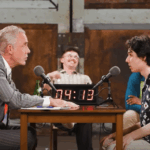By Jonathon Van Maren
Yesterday, braying protestors at McMaster University managed to shut down an event titled “Drawing the Line: Political Correctness and Free Speech,” featuring apparently controversial University of Toronto psychologist Dr. Jordan B. Peterson. The disrupters screamed slurs, blocked exits, blew air horns, threw glitter at Dr. Peterson’s face, and actually assaulted one of the students. The event ended when Dr. Peterson decided that continuing was futile, and chose to engage with students outside. Again, Canadian university students seeking to expose themselves to new and interesting views were faced with physical violence, verbal abuse, and disruption tactics. The cruel irony of “anti-fascist” left-wingers using fascist tactics and seeking to silence academic opposition at all costs was lost on nobody. These are the sorts of protesters who are perpetually on the verge of book-burning.
Fortunately, the Peterson event at the University of Western Ontario today was a model for how campuses can host respectful and productive discussions. I attended with my father and a few friends, and when we showed up on campus to join a line that snaked all the way around the Science Building and back up again, the only two protesters I spotted were actually two free speech warriors who were probably anticipating the McMaster mob or their ideological siblings migrating over to UWO. They did not. The only indication that there was the potential for violence was police officers checking the bags of each attendee at the door, an admittedly severe measure for an academic lecture. The student council, hilariously, had invited counsellors to be on hand in case any of people voluntarily attending the lecture might be so triggered that they might find themselves traumatized.
The lecture hall was filled to capacity with nearly 700 people, if not more. It was extraordinarily encouraging to see hundreds of students turning out on a Saturday afternoon to hear a professor discuss our current culture in a thorough and intellectual fashion. Dr. Jordan B. Peterson is the perfect example of the sort of reasoned, researched, but accessible voice our angry and drifting culture needs, rather than the incendiary name-calling of crude jesters like Milo Yiannopoulos. Throughout his lecture, the crowd remained engaged, interrupting his more passionate appeals to find common ground and reject the radicalism of post-modernism and social reconstructionism with applause.
Peterson spoke for well over an hour, keeping the entire audience riveted as he explained why Bill C-16 was an urgent threat to freedom of speech. Adding gender expression as an explicitly protected class is insane, he pointed out—in fact, we can’t even define such a group, let alone legislate protections against “misgendering” or mandate a variety of recently invented but largely unknown pronouns. He pointed out that by all the statistical data available to us, some 95% of men identify as men and are heterosexual, and that the baseless drive by some academics to use the state to legislate the idea that humans are infinitely malleable is simply their response to having lost the scientific argument.
What was most interesting about Peterson’s lecture—and I’ve listened to many of them online, as well as interviewed him—is that only a truly deluded post-modernist could find it offensive. Peterson backed up each of his points with statistical data, extensive research, psychological analysis, and historical context. It is dangerous to consider that a professor giving such lectures could be considered offensive and controversial—it means that at this point, reality as science reveals it to us and our very history are offensive to protestors. It’s why they yell and chant so loud, Peterson pointed out to laughter. They’re trying desperately to convince themselves above all. But their readiness to use violence and censorship indicates all too clearly what a society in which such people were in charge would look like.
I won’t summarize his entire lecture, as I spotted videographers around the room and so assume that it will be released online in its entirely shortly. But what was again impressive was a professor, who had just lectured for well over an hour, receiving a standing ovation after respectfully responding to difficult questions from people who disagreed with him. Those people responded to disagreement precisely as people should—by asking challenging questions, and waiting to hear the answer. I hope that the event at the University of Western Ontario will show other universities and other students how constructive dialogue actually works.









I wish I could have gone! Tickets sold out too quickly. Thanks for the article!
I was there! I embarassed myself at the end before asking a question but I’m still sad a video hasn’t surfaced 🙁